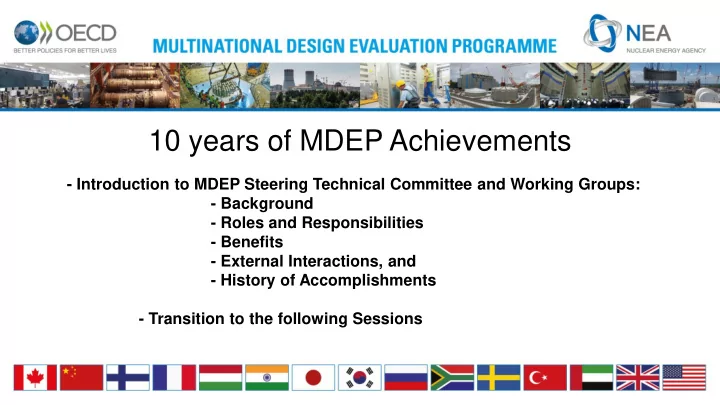

10 years of MDEP Achievements - Introduction to MDEP Steering Technical Committee and Working Groups: - Background - Roles and Responsibilities - Benefits - External Interactions, and - History of Accomplishments - Transition to the following Sessions
Purpose of MDEP - increased cooperation in design evaluations, - enhanced convergence (harmonization) of requirements and practices…
Steering Technical Committee Purpose and Goals The Steering Technical Committee (STC) implements Policy Group decisions by establishing: - The Structure, - The Work Practices, - The Programme Plans, and - The Common Positions
Steering Technical Committee Actions Implements PG decisions on membership: - Translates PG direction into specific activities - Integrates new members into STC and WGs - Forms new working groups - Reviews and approves programme plans - Reviews and approves Common Positions and Technical Reports - Provides recommendations to the PG - Coordinates External Cooperation and Communication
STC Accomplishments STC undertook special projects: - Safety Goals Paper (published on MDEP website and shared with IAEA) - 2011 draft Generic Common Position on Fukushima Daiichi Related Issues - MDEP Self-Assessment, 2011 report on MDEP website discussed with PG - First-Plant-Only-Tests, 2016 [to be discussed in Session 5] - Fukushima-Daiichi Accident Common Positions, 2016 [to be discussed in Session 4] - Annual reports - MDEP conferences
MDEP current organisational structure
Design-Specific Working Groups benefits and historical accomplishments - 14 Common Positions and Technical Reports - Increased Cooperation in design evaluations - Increased Communications - Greater degree of harmonization in review practices [to be discussed in Session 4]
Codes and Standards Working Groups benefits and historical accomplishments - Pressure boundary code comparison (with industry cooperation) - Regulatory Frameworks for Pressure-Boundary Codes and Standards - Lessons Learnt on achieving harmonization - Fundamental Attributes for Pressure-Boundary Components - Essential Performance Guidelines for Pressure Boundary Components [to be discussed in Session 1]
Digital I&C Working Groups benefits and historical accomplishments - 13 Common Positions on critical Digital I&C Issues Common Position Development by numerous members - Common Positions Organized around Hazards Analysis - Used in Design-Specific Evaluations - Input to IAEA Standards - Coordinated with IEC and IEEE [to be discussed in Session 2]
Vendor Inspection Cooperation Working Groups benefits and historical accomplishments - Vendor Inspection Protocol - Quality Assurance (QA) requirements survey - Common Positions on QA/QM Criteria - Technical Report on Vendor Inspection Good Practices - Technical Report on Multinational Vendor Inspection - Numerous MDEP Vendor Inspections [to be discussed in Session 3]
Interactions with external organizations STC identifies ways to work with and influence other programs and organizations: - With IAEA (from the very beginning) - IAEA programs and activities discussed at all STC meetings - MDEP STC Safety Goal paper forwarded to IAEA - MDEP DICWG Common Positions provided to IAEA - MDEP members coordinated views on Safety Classification
Interactions with external organizations With Standards Development Organizations: - ASME, AFCEN, CSA, JSME, KEA, and NIKIET - Encouraged development of: - the Code Comparison Report - the Code Convergence Board - the Regulatory counterpart forum - IEC - IEEE joint cooperation agreement
Interactions with external organizations With WNA/CORDEL: - STC coordinates with WNA/CORDEL Working Group - DICWG and CSWG reports and studies provided to CORDEL - CORDEL Taskforces coordinated efforts with MDEP With WENRA With GIF
The Continuing Evolution of MDEP - Existing Design-Specific Working Groups in transition - New Design-Specific Working Groups, as needed - New members when appropriate - Generic Activities in transition to NEA Committees - Increased Coordination and Interaction… - Positive influence on IAEA and NEA/CNRA [to be discussed in Session 6]
Recommend
More recommend